Time-dependent reversal of long-term potentiation by low-frequency stimulation at the hippocampal mossy fiber-CA3 synapses
- PMID: 11356857
- PMCID: PMC6762690
- DOI: 10.1523/JNEUROSCI.21-11-03705.2001
Time-dependent reversal of long-term potentiation by low-frequency stimulation at the hippocampal mossy fiber-CA3 synapses
Abstract
Using mouse hippocampal slices, we studied the induction of depotentiation of long-term potentiation (LTP) at the mossy fiber synapses onto CA3 pyramidal neurons. A long train of low-frequency (1 Hz/900 pulses) stimulation (LFS) induced a long-term depression of baseline synaptic transmission or depotentiation of previously established LTP, which was reversible and was independent of NMDA receptor activation. This LFS-induced depotentiation was observed when the stimulus was delivered 1 or 10 min after LTP induction. However, when LFS was applied at 30 min after induction, significantly less depotentiation was found. The induction of depotentiation on one input was associated with a heterosynaptic reverse of the LTP induced previously on a separate pathway. In addition, this LFS-induced depotentiation appeared to be mediated by the activation of group 2 metabotropic glutamate receptors (mGluRs), because it was mimicked by the bath-applied group 2 agonist (2S,2'R,3'R)-2-(2', 3'-dicarboxycyclopropyl) glycine and was specifically inhibited by the group 2 antagonists (S)-alpha-methyl-4-carboxyphenylglycine and (alphaS)-alpha-amino-alpha-(1S,2S)-2-carboxycyclopropyl-9H-xanthine-9-propanic acid. Moreover, the induction of depotentiation was entirely normal when synaptic transmission is blocked by glutamate receptor antagonist kynurenic acid and was associated with a reversal of paired-pulse facilitation attenuation during LTP expression. Pretreatment of the hippocampal slices with G(i/o)-protein inhibitor pertussis toxin (PTX) prevented the LFS-induced depotentiation. These results suggest that the activation of presynaptic group 2 mGluRs and in turn triggering a PTX-sensitive G(i/o)-protein-coupled signaling cascade may contribute to the LFS-induced depotentiation at the mossy fiber-CA3 synapses.
Figures
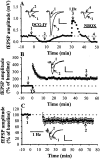

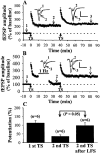
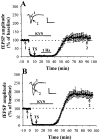
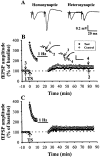



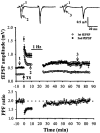
References
-
- Amaral DG, Witter MP. The three-dimensional organization of the hippocampal formation: a review of anatomical data. Neuroscience. 1989;31:571–591. - PubMed
-
- Anwyl R. Metabotropic glutamate receptors: electrophysiological properties and role in plasticity. Brain Res Rev. 1999;29:83–120. - PubMed
-
- Arai A, Kessler M, Lynch G. The effects of adenosine on the development of long-term potentiation. Neurosci Lett. 1990a;119:41–44. - PubMed
-
- Arai A, Larson J, Lynch G. Anoxia reveals a vulnerable period in the development of long-term potentiation. Brain Res. 1990b;511:353–357. - PubMed
-
- Barrionuevo G, Schottler F, Lynch G. The effects of repetitive low frequency stimulation on control and “potentiated” responses in the hippocampus. Life Sci. 1980;27:2385–2391. - PubMed
Publication types
MeSH terms
Substances
LinkOut - more resources
Full Text Sources
Miscellaneous
